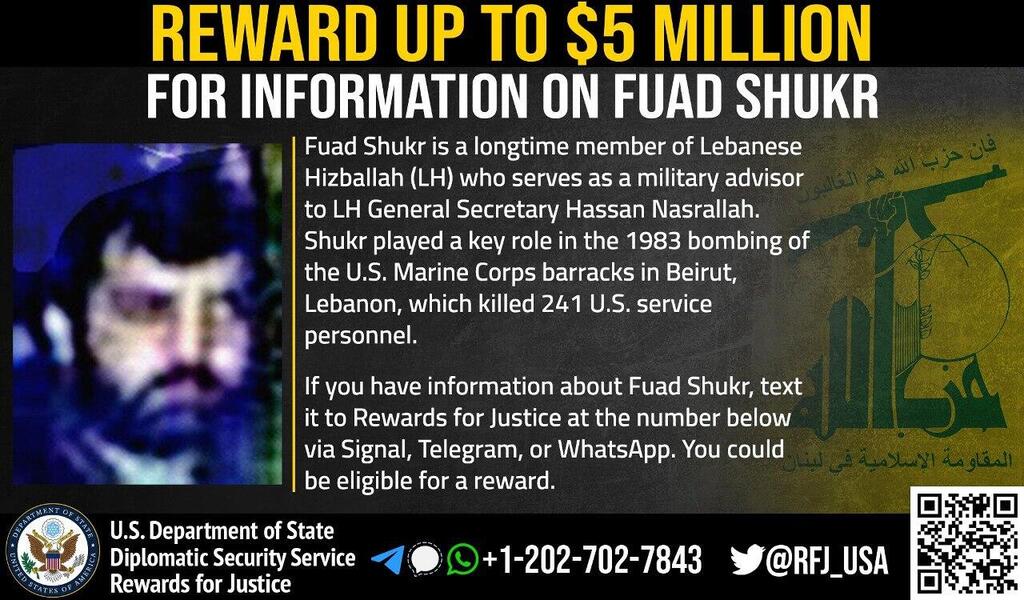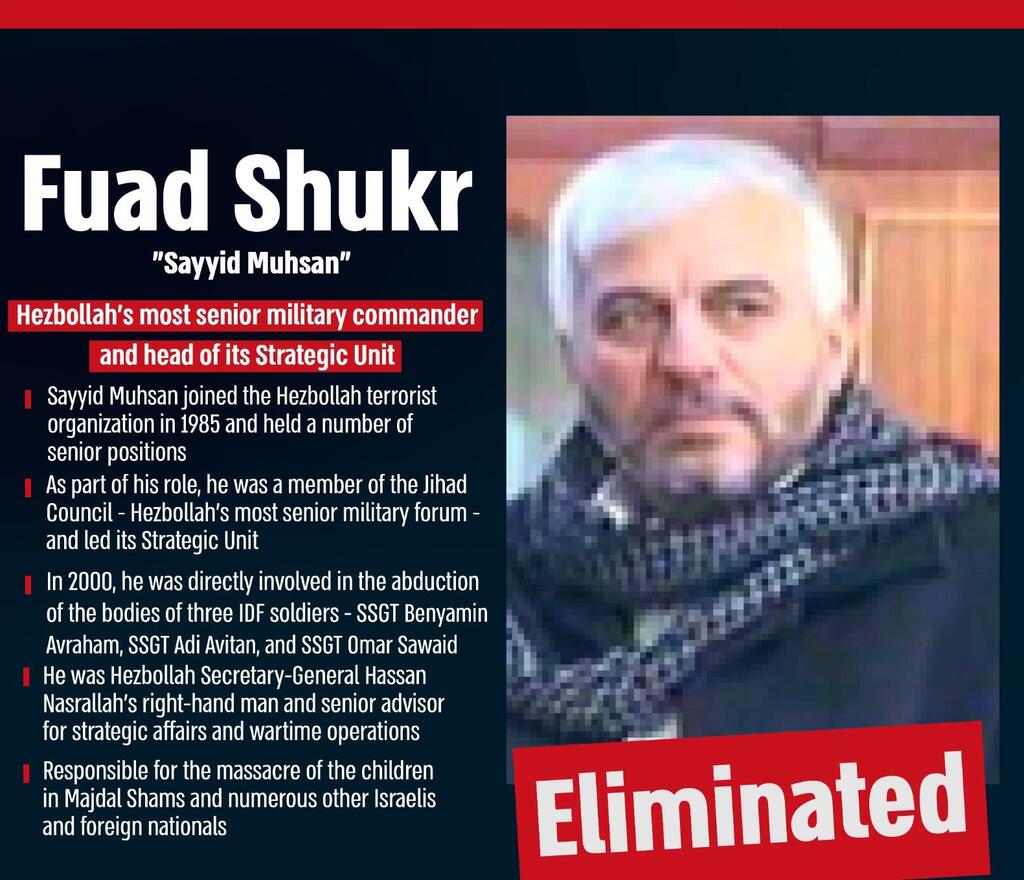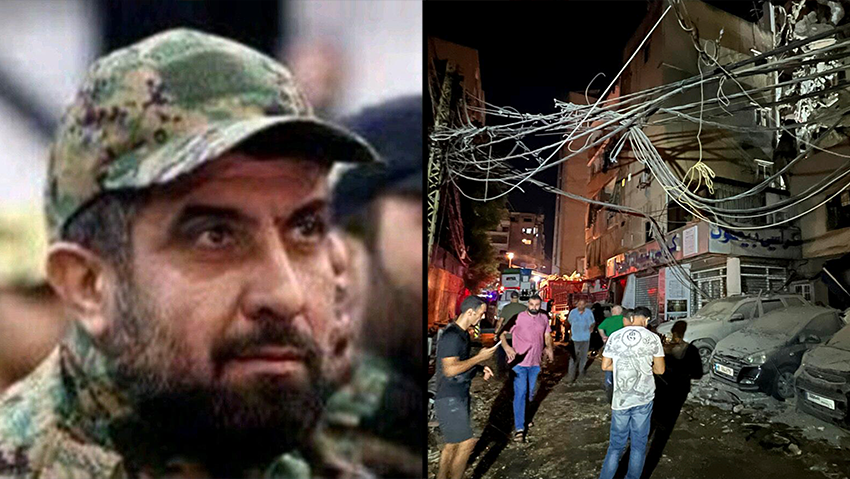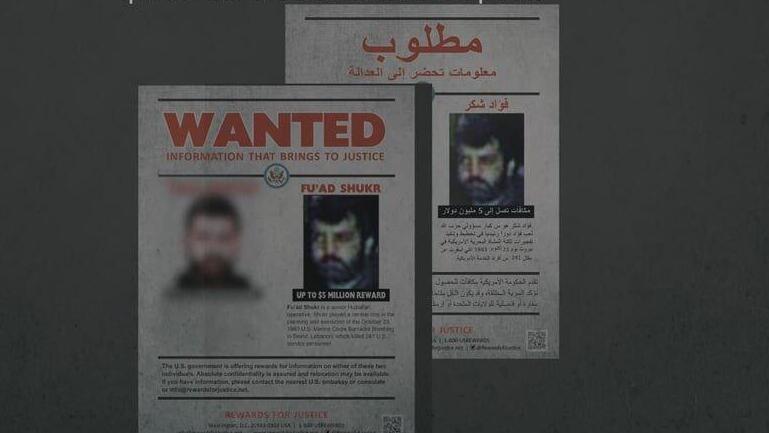Getting your Trinity Audio player ready...
Hezbollah Secretary General Hasan Nasrallah's elusive advisor Fuad Shukr, long sought by American intelligence, mastermind behind Hezbollah's precision missile project and one of the organization's top military commanders, was the target of the IDF's strike on Tuesday evening in Beirut's Dahieh district.
Shukr, a 30-year veteran of Hezbollah, holds a prominent position on the Jihad Council and serves as the chief military commander in southern Lebanon. He played a pivotal role in orchestrating the 1983 attack on the Marine barracks in Beirut, which claimed the lives of 241 American soldiers. Due to his involvement, the U.S. State Department has placed a $5 million bounty on his head.
Born in Hezbollah stronghold
Born in Al-Nabi Sheeth in the Bekaa Valley, Shukr, also known as "Hajj Mohsinn," was revealed by "Intelli Times" to be part of Hezbollah's founding core, working alongside figures including Imad Mughniyeh, Mustafa Badreddine, and Mustafa Shihadeh. Rising through the military ranks, Shukr has overseen numerous operations against Israel, possibly including the abduction of soldiers. As a member of the Jihad Council, he advises Hezbollah's leadership on military operations, including coordinating with Iran's Quds Force to support semi-military groups across the region, from Shiite militias in Afghanistan and Iraq to underground cells in Bahrain and Saudi Arabia.
Shukr's roots trace back to Al-Nabi Sheet, the same village as Abbas al-Musawi, Hezbollah's secretary-general from 1991 until his assassination by Israel in 1992, after which Nasrallah took over. Over the years, Al-Nabi Sheeth has emerged as a Hezbollah stronghold, used for storing weapons smuggled from Syria. The Shukr family resides near the Musawi family. An investigation claimed that the Shukr family home in Al-Nabi Sheeth was identified as the last place where missing Israeli navigator Ron Arad was held on the night of May 3-4, 1988, before he disappeared, based on a 2008 Hezbollah report.
Many family members still belong to the Amal Movement, while others are educated in Iranian institutions. The clan also has connections in South America, particularly with the community in São Paulo, where Hezbollah's infrastructure has been detected.
Explosion in Beirut
Further evidence of this is the family ties with cleric Bilal Mohsen Wahabi, a senior member of Hezbollah's foreign relations unit, who, along with Ali Mohammed Kazan, engaged in fundraising, recruiting activists and establishing ties with drug cartels, creating dormant cells for potential attacks. In recent years, Shukr has operated primarily from Dahieh, the southern suburb of Beirut, considered Hezbollah's unchallenged stronghold.
Military ties with Iran
Shukr received his military education at Imam Hussein University in Tehran. According to the investigation, American intelligence reports from 2002 revealed that Shukr was dispatched to Tehran to handle a shipment of Stinger missiles (shoulder-fired anti-aircraft missiles) in September 1994, as part of Iran's effort to arm Hezbollah. Before the Syrian civil war, Shukr was identified as the commander of the southern Lebanon sector, Hezbollah's most crucial military area.
In recent years, Shukr has led military operations in Syria alongside the assassinated Mustafa Badreddine and Iran's Quds Force. In 2013, he was added to the U.S. Treasury Department's sanctions list for entities and individuals involved in terrorism.
In October 2014, Mustafa Shihadeh, a longtime comrade of Imad Mughniyeh, died of a severe illness, leaving Shukr as one of the last members of the military core established by Mughniyeh.
In November 2015, Saudi authorities announced a new list of Hezbollah operatives designated as terrorists, subjecting them to sanctions for their roles in the organization's activities in the Middle East. Among the 12 names, Shukr's name stood out alongside Mustafa Badreddine, who was also accused of involvement in the assassination of former Lebanese Prime Minister Rafik Hariri.
Lebanese media sources have described Shukr as fiercely loyal to Nasrallah and aligned with Iran. Following the mysterious assassination of Mustafa Badreddine, who reportedly had tensions with Iran, Shukr was also mentioned as a potential successor.









